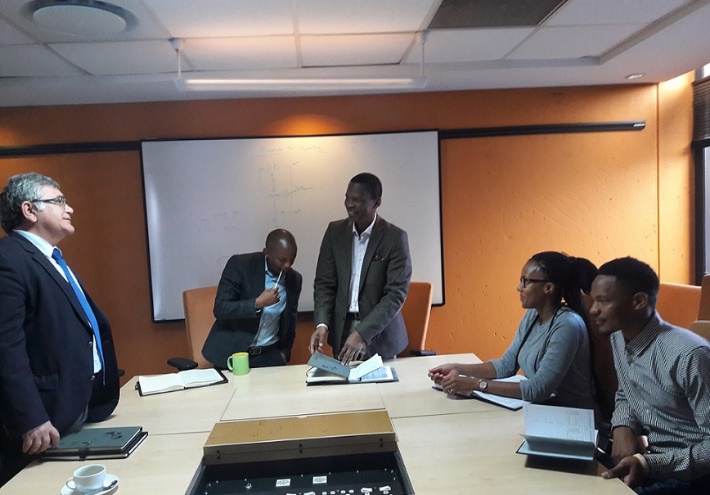In Pretoria, ISTC and South African Partners Discuss New Areas of Cooperation

 Less than a year after establishing formal ways of cooperation with South Africa’s National Nuclear Regulator (NNR), ISTC discussed with key national counterparts in Pretoria the prospects for new collaborative initiatives. A series of meetings took place at the Department of International Relations and Cooperation (DIRCO), the Department of Trade and Investment (DTI) and the Department of Science and Technology (DST) in the beginning of August. Kamen Velichkov, ISTC’s Senior Programme Manager and Diplomatic Advisor debriefed its interlocutors about the progress of the EU-funded project Support to Southern African states in nuclear security and safeguards, which ISTC implements jointly with the NNR’s Centre for Nuclear Safety and Security. Building on the current successful collaboration, ISTC envisages expanding to South Africa its programme on export control of dual-use materials and technologies. It also seeks to reinforce formal relations with the RSA. To deepen the conversation about these topics, representatives of ISTC’s Governing Board consider a visit to South Africa in the coming months.
Less than a year after establishing formal ways of cooperation with South Africa’s National Nuclear Regulator (NNR), ISTC discussed with key national counterparts in Pretoria the prospects for new collaborative initiatives. A series of meetings took place at the Department of International Relations and Cooperation (DIRCO), the Department of Trade and Investment (DTI) and the Department of Science and Technology (DST) in the beginning of August. Kamen Velichkov, ISTC’s Senior Programme Manager and Diplomatic Advisor debriefed its interlocutors about the progress of the EU-funded project Support to Southern African states in nuclear security and safeguards, which ISTC implements jointly with the NNR’s Centre for Nuclear Safety and Security. Building on the current successful collaboration, ISTC envisages expanding to South Africa its programme on export control of dual-use materials and technologies. It also seeks to reinforce formal relations with the RSA. To deepen the conversation about these topics, representatives of ISTC’s Governing Board consider a visit to South Africa in the coming months.
The meeting with Johan Kellerman, Director of Disarmament and Non-proliferation at DIRCO, focused on all aspects of ISTC’s envisaged initiatives in South Africa. A project on export control of dual use materials and technologies consists, for example, on updating the existing export control systems; developing and introducing relevant academic courses and practical training; offering PhD grant based on competitive contest; collaboration amongst researchers through a web-based platform; support and outreach to industry. ISTC representatives could present to the relevant South African bodies international best practices in streamlining the process of export control of dual uses items and technologies. In addition, a more structured partnership with ISTC would offer to the country opportunities to share its unique experience in nuclear non-proliferation as well as in dealing with various challenges in the full CBRN spectrum. A working visit to South Africa of members of ISTC’s Governing Board could be a stepping-stone in furthering these initiatives.
During the meeting at the South Africa’s Department for Trade and Industry (DTI), Daryl Hudson, Director for Middle East and Central Asia, and Matome Mookodi from the Secretariat of the SA Council for non-proliferation and weapons of mass destruction commented on the legal and institutional framework for trade control of dual use items. The exchange identified ways and means to approach national counterparts, responsible for various aspects of nuclear non-proliferation.
Representatives of the Department of Science and Technology (DST) - a prime point of contact for all research, innovation and knowledge exchange-related questions - expressed their readiness to assist in connecting ISTC to research communities, university networks and responsible institutional stakeholders. Khaya Sishuba, Director, International Relations at DTI, acknowledged the progress of the first joint project that SA and ISTC implement together and encouraged ISTC participation in the annual South Africa Science Forum.
At the University of Pretoria ISTC held a meeting with Prof Sunil Maharaj, Dean: Faculty of Engineering, Built Environment and Information Technology (EBIT); Prof Josua Meyer, Head of Department and Division Head: Clean Energy; and Prof Johan Slabber from the same Department. The interlocutors concurred that researchers and scientists from South Africa and Southern African countries could benefit from the accumulated experiences and expertise of both ISTC and EBIT in the future. Separately, ISTC met with Prof. James Larkin, Director, Radiation and Health Unit, University of the Witwatersrand, Johannesburg.
ISTC and its South African partners met in Pretoria at the fringes of the fourth meeting of the Steering committee of Project MC 5.01/15B Support to Southern African states in nuclear safety and safeguards, which was combined with a gathering of representatives of the nuclear regulators from SADC member states. Project MC 5.01/15B targets four countries – Malawi, Tanzania, Zambia and Namibia, while seeking to engage all SADC member states by offering them to join a web-based information and communication system that will help track, monitor and account for the transportation of Uranium ore in Southern Africa. The project endeavors as well to help institutionalize the currently informal network of SADC national nuclear regulators. NNR-CNSS, as the more mature national institution in the region, stepped into the project last year to assist in its implementation.

